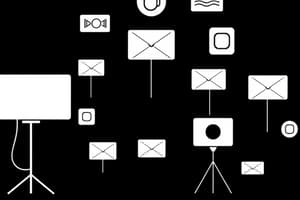Podcast
Questions and Answers
Match the following PR activities with their descriptions:
Match the following PR activities with their descriptions:
Crisis Management = Developing contingency plans for public relations crises Reputation Management = Monitoring and managing a company's online presence Content Marketing = Creating and distributing valuable content to attract audience Influencer Marketing = Partnering with social media influencers to promote products
Match the following PR principles with their descriptions:
Match the following PR principles with their descriptions:
Ethics in Public Relations = Adhering to honesty, transparency, and privacy standards Future of Public Relations = Adapting PR strategies to changing media and consumer behavior Diversity and Inclusion in PR = Influencing how PR professionals approach their work Importance of Reputation in PR = Building positive relationships with the public
Match the following digital platforms with PR strategies:
Match the following digital platforms with PR strategies:
Social Media = Adapting PR strategies to reach audiences Podcasts = Platforms for reaching audiences with PR messages Blogs = Channels to distribute valuable content for PR Traditional Media = Older platforms influencing PR strategies
Match the following event management terms with their definitions:
Match the following event management terms with their definitions:
Match the following PR challenges with their solutions:
Match the following PR challenges with their solutions:
Match the following content marketing terms with their purposes:
Match the following content marketing terms with their purposes:
Match the following PR techniques with their descriptions:
Match the following PR techniques with their descriptions:
Match the following historical facts with their descriptions:
Match the following historical facts with their descriptions:
Match the following PR concepts with their definitions:
Match the following PR concepts with their definitions:
Match the PR strategies with their purposes:
Match the PR strategies with their purposes:
Match the following modern PR tools with their functions:
Match the following modern PR tools with their functions:
Match the following PR elements with their impacts:
Match the following PR elements with their impacts:
Flashcards are hidden until you start studying
Study Notes
Public Relations
Public relations (PR) refers to the management of communication between a company and its publics. It involves planning, executing, and managing various campaigns and strategies to shape public perception of a brand or organization. PR is a two-way process between organizations and their stakeholders where information is shared to create understanding and positive perceptions.
History of Public Relations
The roots of modern public relations can be traced back to ancient civilizations such as Greece and Rome. However, the term "public relations" was first used in 1897 by Ivy Lee, a U.S. pioneer in the field. Over time, PR has evolved from small businesses using word of mouth to large corporations using media outlets to reach a wider audience. Today, PR agencies help companies manage their image through various channels including traditional press releases, social media, digital marketing, and events.
Techniques and Strategies
Effective PR relies on several techniques and strategies to engage with target audiences and build relationships. These include:
-
Press Releases: Written communications sent to journalists and media outlets announcing news or developments within an organization.
-
Media Relations: Building relationships with journalists and editors to secure positive coverage and manage negative publicity.
-
Crisis Management: Developing contingency plans to handle public relations crises, such as data breaches or negative public sentiment.
-
Reputation Management: Monitoring and managing a company's online presence to control the narrative about the brand.
-
Content Marketing: Creating and distributing valuable, relevant, and consistent content to attract and retain a clearly defined audience.
-
Influencer Marketing: Partnering with social media influencers to promote products or services to their followers.
-
Event Management: Organizing and executing events to engage with customers and generate buzz around a brand.
Ethics in Public Relations
Ethics play a crucial role in public relations. PR professionals must adhere to ethical standards, such as honesty, transparency, and respect for privacy. This includes disclosing any conflicts of interest and not engaging in deceptive practices, such as spreading misinformation or manipulating public sentiment.
Future of Public Relations
The future of public relations is shaped by the changing media landscape and consumer behavior. With the rise of digital media, PR strategies must adapt to reach audiences across various platforms, including social media, podcasts, and blogs. Additionally, the increasing importance of diversity and inclusion in the workplace will influence how PR professionals approach their work.
In conclusion, public relations is a vital aspect of any organization's communication strategy, helping to build positive relationships with the public and manage reputation. As the media landscape continues to evolve, PR professionals must remain adaptable and ethical in their approach to effectively communicate with their audiences.
Studying That Suits You
Use AI to generate personalized quizzes and flashcards to suit your learning preferences.





